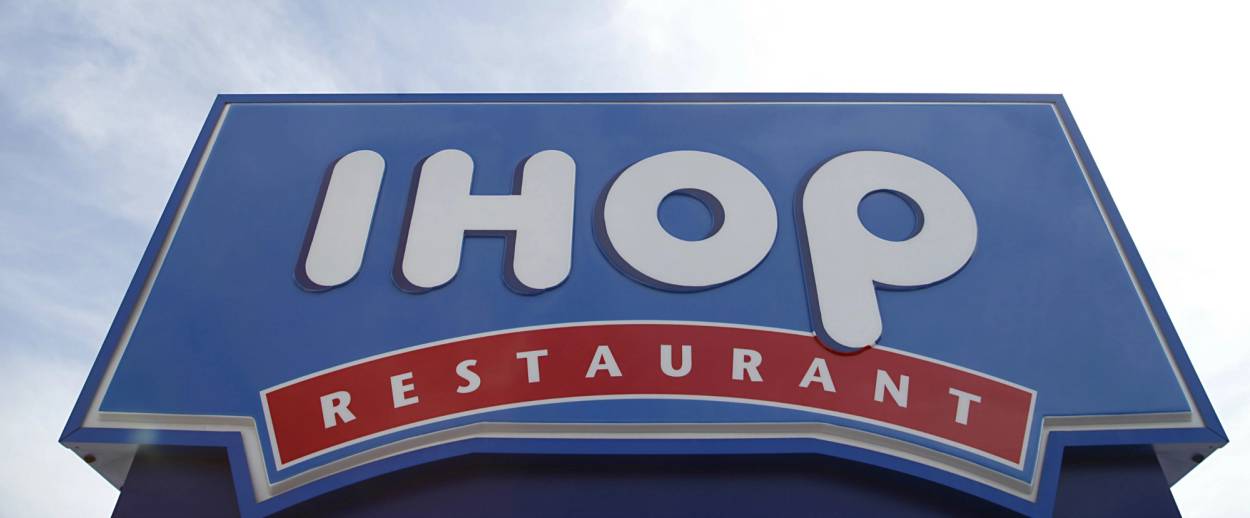An All-Night Shavuot Celebration at the IHOP
Combining the holiday’s tradition of study with the American tradition of the 24-hour diner




In Judaism, there’s the custom of the tikkun leil Shavuot—learning during the first night of Shavuot, even all night, if possible.
In America, there’s a different venerable all-night tradition: The 24-hour diner.
So this year, why not make them the two great tastes that taste great together? You can try combining them at Lex Rofeberg’s all-night celebration at an IHOP in Providence, Rhode Island.
“We had somehow internalized that idea that Shavuot wasn’t relatable to people,” Rofeberg told Tablet. “We need to move Shavuot out of the beit midrash and think about places where it could manifest, where it’s going to be impossible for it to be dry and serious. I don’t think we use the word ‘fun’ about shavuot enough.”
Rofeberg has reserved a table for 12, and reached out to a few friends who can come and teach. Some of the material will be about traditional Jewish texts, but he’ll also have his laptop handy, and is open to watching episodes of Crazy Ex-Girlfriend or Seinfeld that explore Jewish identity. Super regimented programming while tucking into Rooty Tooty Fresh ‘N Fruity pancakes doesn’t seem particularly apt.
“I’m ready to let the moment take us where it does,” he said.
Rofeberg is a Rabbinical student in the Renewal Movement. Although he’s 27, he’s only celebrated Shavuot for about seven years.
“When I discovered it in college I thought it was genius,” he said. “What a shame that I didn’t know about this!”
Certainly, despite its religious importance, Shavuot has been relegated to a minor holiday in the United States. But many American Jews, including Rofeberg, think that it’s an underused opportunity to explore the many facets of Jewishness. For example, Rofeberg wants his tikkun to include conversations about bagels. Sure, that’s going to start light, inspired by the famous latkes vs. hamantashchen debate— can a bagel constitute a meal? What is the ideal shmear? But then the conversation can turn into questions about Jewish identity, the relationship between Jews and food, the role of ashkenormativity in America.
“Shavuot is a celebration of Jewish life,” he said. “I see it as an occasion to delve into whatever Jewish stuff you want to delve into.”
When Rofeberg started planning the tikkun, he put the word out to friends, and he inspired others. This year, there are at least five Shavuot celebrations happening at diners, pancake houses, or other all-night establishments (conveniently, the holiday falls on a weekend this year). Other than Providence, you can have your tikkun leil shavuot with a side of eggs and toast in Albany, Washington D.C., Maryland, or Jackson.
If you crave traditional holiday food, IHOP sells crepes—which are practically blintzes—and even cheesecake pancakes. Plus, Shavuot was historically a wheat-harvesting festival, so there are plenty of whole-grain options at most eateries. But Rofeberg is celebrating chag at a pancake chain; he’s already broken free of the mainstream.
“There was a point in time where cheesecake wasn’t a Shavuot food, and then it was,” he said. “Hypothetically, if thousands and thousands of people started going to diners on Shavuot, would that mean that hash browns are a traditional food on Shavuot? Maybe. I want us to challenge the idea that it’s only received traditions that are authentic traditions, and not those that we create today.”
And how will the employees respond to the large groups of people talking and eating all night? If you’ve ever been to an IHOP at 2 a.m., you know that that staff has dealt with weirder, tougher crowds than Jews learning Torah.
Anyone interested in connecting with Rofeberg about their own all-night pancake tikkun can reach him at [email protected].
Gabriela Geselowitz is a writer and the former editor of Jewcy.com.